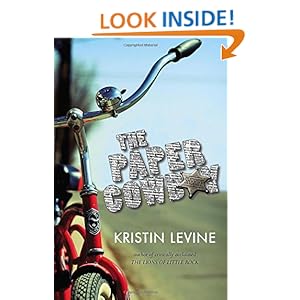I had one of those trips to the library, where every book I touched I knew was a gem. Here is one glorious, rich, challenging find from that visit:
Gestapo. Holocaust. SS guards/soldiers/ commandant. Aushwitz-Birkenau concentration camp. Hanna. Karl. Family. Black C sharp piano key. I so appreciate the current offerings from YA authors centering on the Holocaust, and here Zail offers us a whole new view, that of a commandant's son. Much like some of my other writing, occasionally these blog entries write themselves. Not this one. I feel vastly inadequate as I try to represent what the story is about and in turn, how it touches me. Inadequate indeed.
Like so many other Jews in Budapest, Hanna and her family are hatefully transported out of their lives (again!) and into Aushwitz-Birkenau on Polish lands. As soldiers separate the family, her father tells her to tell the world about all the autrocities they are experiencing and what is unfortunately to come. While the tragic story continues as soon, only Hanna and her sister remain together. Ironically Hanna becomes the piano player for the commandant of Aushwitz. She travels daily to his compound, playing when he commands and waiting patiently while he is not in the piano room. In time, she learns she can take small food scraps from the kitchen, benefitting both her, her sister, and their block leader. The ugliness of surviving in a concentration camp brutalizes most moments throughout the book, but the tender, subtle sliver of light comes from the commandant's son Karl. He calls Hanna by name not number, and in numerous stark moments at his father's house, he sees the prisoners as humans. A musician and singer in his own life, Karl moves to the music Hanna plays. Ironically this story has romance in it, a move that completely surprised me and alters the story in such twisty ways.
Zail writes Holocaust stories regularly, some of which connect to her father's experience as a survivor of that atrocity. More than worth exploring, Zail brings us a rich story in Playing for the Commandant. Explore it.
Post-script: Thank you to the two commenters who helped me realize a major error in my framing of this book. Aushwitz-Birkenau is not and never has been a Polish concentration camp/; it was established by the Germans on Polish soil and in no way was created by the Polish people/government in any way, shape, or form. I apologize for my misstatements, and/or misguiding words and I greatly appreciate the views from readers.
Thank you, readers, who continue to expand my knowledge.
Gestapo. Holocaust. SS guards/soldiers/ commandant. Aushwitz-Birkenau concentration camp. Hanna. Karl. Family. Black C sharp piano key. I so appreciate the current offerings from YA authors centering on the Holocaust, and here Zail offers us a whole new view, that of a commandant's son. Much like some of my other writing, occasionally these blog entries write themselves. Not this one. I feel vastly inadequate as I try to represent what the story is about and in turn, how it touches me. Inadequate indeed.
Like so many other Jews in Budapest, Hanna and her family are hatefully transported out of their lives (again!) and into Aushwitz-Birkenau on Polish lands. As soldiers separate the family, her father tells her to tell the world about all the autrocities they are experiencing and what is unfortunately to come. While the tragic story continues as soon, only Hanna and her sister remain together. Ironically Hanna becomes the piano player for the commandant of Aushwitz. She travels daily to his compound, playing when he commands and waiting patiently while he is not in the piano room. In time, she learns she can take small food scraps from the kitchen, benefitting both her, her sister, and their block leader. The ugliness of surviving in a concentration camp brutalizes most moments throughout the book, but the tender, subtle sliver of light comes from the commandant's son Karl. He calls Hanna by name not number, and in numerous stark moments at his father's house, he sees the prisoners as humans. A musician and singer in his own life, Karl moves to the music Hanna plays. Ironically this story has romance in it, a move that completely surprised me and alters the story in such twisty ways.
Zail writes Holocaust stories regularly, some of which connect to her father's experience as a survivor of that atrocity. More than worth exploring, Zail brings us a rich story in Playing for the Commandant. Explore it.
Post-script: Thank you to the two commenters who helped me realize a major error in my framing of this book. Aushwitz-Birkenau is not and never has been a Polish concentration camp/; it was established by the Germans on Polish soil and in no way was created by the Polish people/government in any way, shape, or form. I apologize for my misstatements, and/or misguiding words and I greatly appreciate the views from readers.
Thank you, readers, who continue to expand my knowledge.


